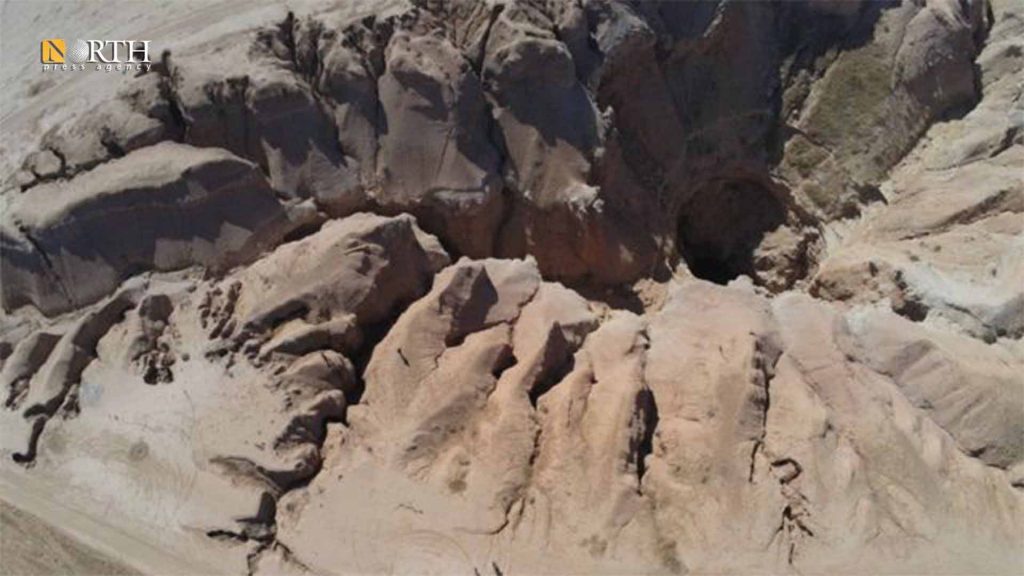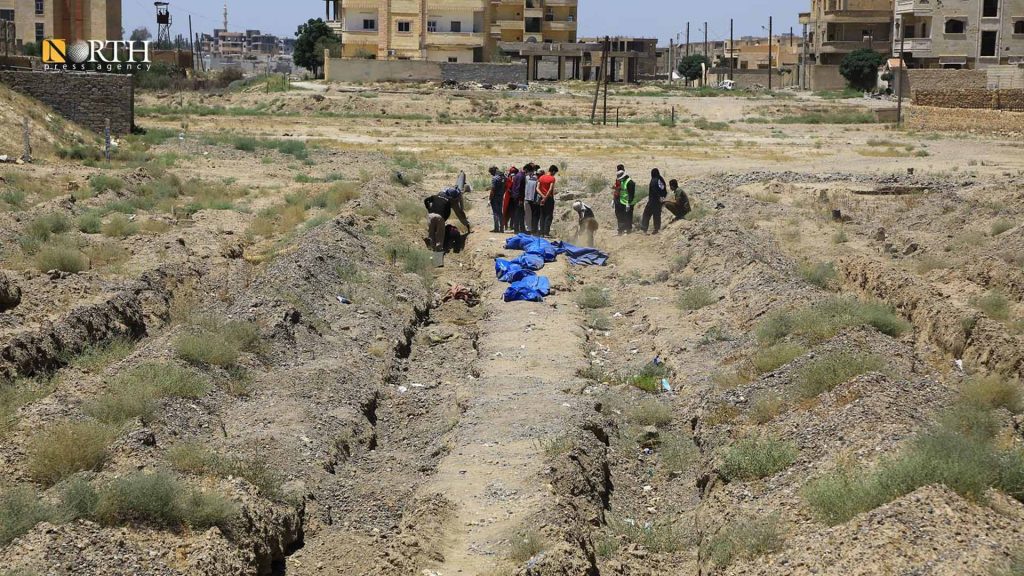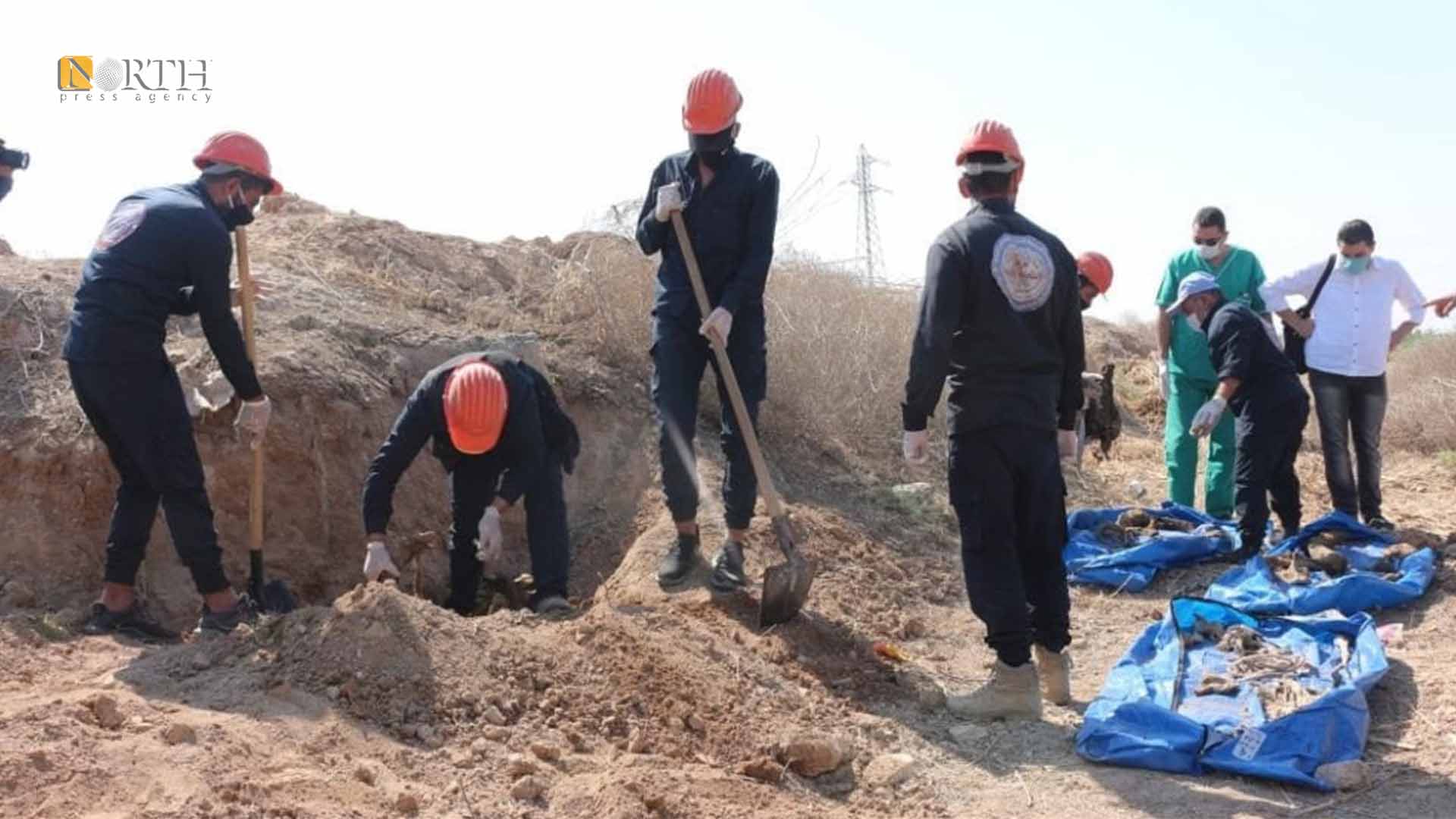RAQQA, Syria (North Press) – The 31-year-old Ahmad al-Mousa, a resident of the city of Raqqa, north Syria, is talking about the arrest of his father in winter, 2015 by the Islamic State (ISIS) describing that day as “unforgettable night” especially since he does not know anything about his father.
The expansion of the ISIS influence in Syria and Iraq coincided with horrific public violations, while broad-scale arrests and kidnappings were committed by unknown group under the name of “al-Amnyyin” (security individuals).
However, those arrests were not less horrific that the ones publically committed such as kidnapping thousands of people from their houses, cars, and on the checkpoints causing thenm to go missing.
Dark night
Two masked men, who dressed in black and called themselves security individuals, knocked on the door and demanded al-Mousa to ask his father to meet them under the pretext of posing some questions and then they arrested the father, al-Mousa narrates the incident of arresting his father in 2015.
Although al-Mousa and his brothers asked about the reason for the arrest, one of the men replied, “there is no need to be worried, rest assured,” in an attempt not to create chaos and confusion in the neighborhood where the family reside.
They arrested the father under the pretext of spying and that he was an employee and a member of the ruling Ba’ath Party in Syria and that he posed a threat to the ISIS presence, according to al-Mousa.
Arresting civilians had been carried out successively and in different areas held by ISIS, al-Mousa noted.
“Two or three individuals dressed in black, taciturn, and informed the family of the arrestee that they just want to question the arrestee and he will be backed within few hours.”
The way that ISIS militants were accompanying him with them did not suggested that they will kill him “even the leader of the group, who spoke in Syrian dialect stressed that he himself will bring him back,” al-Mousa added.
Two days later, al-Mousa and his mother began heading to ISIS headquarters in Raqqa including al-Mal’ab Prison, which was known as the point 11, al-Sad prison in Tabqa, and other headquarters in the region, but he obtained no information about his father “Muhammad”.
The most terrifying and cruel prisons of ISIS, according to activists of the city, are “the point 11, al-Mal’ab al-Baladi, the governorate building, and al-Sad in the city of Tabqa.”
Following months of search, an arrestee, who was in the same custody with al-Mousa’s father “Muhammad”, was released and said that his father spent about a month in the custody and he was released.
Seven years after the father went missing, his fate is still unknown and al-Mousa and his family do not know whether Muhammad is still alive or “he lost his life in a detention center, or his body is now under ground in one of the mass graves that ISIS committed.”
Al-Mousa sees that the responsible bodies do not take serious steps to reveal the fate of those missing noting that “it is negligence that is incompatible with the horrible disaster that hit them.”
Al-Mousa demanded the formation of an office so-called “Families of Missing” in order to know the fate of their missing “Even if the missing person is dead, we will honored him by burring him according the known norms.”
Terrifying graveyard
Several video footages were released during the ISIS period in Raqqa showing ISIS militants throwing victims in a pit in an area 85 km north of Raqqa between the town of Suluk and al-Qantari called “al-Hota gorge”, according to decisions issued by ISIS “Shari’a Courts.”

Al-Hota gorge, which is surrounded by valleys, is one of the tourist shrines that was known as “graveyard of terror or apostate pit” of ISIS and the largest mass grave, according to activists of the city.
The 41-year-old Ismail al-Hamoud, a resident of the village of al-Samra, east of Raqqa, remembers when two cars with individuals looked evil, stopped by his shop that he shared with his brother Ibrahim in the summer of 2016.
Three militants get out of the cars violently shouting and describing al-Hamoud’s brother as “apostate” before reaching the shop.
Al-Hamoud’s younger brother, who was an employee in a directorate of the Syrian government, used to head to areas held by the government in order to receive his wages.
“The accusation of my brother, according to their allegation, was spying in favor of the Syrian government in addition to conveying ISIS moves to the government, al-Hamoud noted.
Is he still alive?
Al-Hamoud tried secretly to inquire about his brother’s place and fate asking one of his relatives, who had ties with ISIS at the time, but all was in vain.
“My relative told me that my brother’s fate is either to be buried or thrown in al-Hota gorge (Apostate pit),” al-Hamoud said.
He pointed out that his relatives warned him not to ask about his brother, “as any attempt to search for a detainee can expose the questioner to the same fate.”
Many other families still do not know about the fate of their missing people since there are no authorities to follow up on their issues or provide information if available, according to al-Hammoud.

Obtaining information about missing, during ISIS era, was through either those who knew were responsible for digging the mass graves or other parties linked to ISIS leaders, and often former prisoners of the organization, as for local rumors were unconfirmed, al-Hamoud said.
Al-Hamoud did not know if his brother was alive or not, “even if he was dead at the time, they would not allowed us to hold a funeral for him, according to their laws, he is not a Muslim and should not be buried in Muslim cemeteries, but in mass graves.”
“Although ISIS was eliminated and defeated, so far, no influenced authority has provided us with information about those who went missed with the same question repeats in our minds, Is he still alive?”
Al-Hamoud demands that the exhumed bodies of the mass graves should be subjected to examination according to high quality system with specialized doctors in order to recognize the bodies as soon as possible allowing each family to know about their missing.”
Currently, al-Hota gorge is located in an area held by the Turkish-backed Syrian National Army (SNA) and it is now a crime scene for investigations on crimes that were previously committed by ISIS, according to Human Rights Watch.
Unidentified corpses
Several mass graves left by ISIS were found in Raqqa after it was eventually vanquished by the US-led Global Coalition and SDF on October 17, 2017.
Photo 4
28 mass graves had been documented so far in different areas of Raqqa and its countryside since late 2017.
The First Response Team of the Raqqa Civil Council was established on April 18, 2017 in order to exhume the bodies from mass graves, but it began work on January 19, 2018.
Most of the exhumed bodies from the mass graves are unidentified, due to the lack of a DNA test device, Yasser al-Khamis, head of the First Response Team in Raqqa, said.
The Forensic Medicine Committee takes samples for safekeeping and documentation in order to examine the DNA, and sends these samples abroad to be able to identify some of the bodies, according to al-Khamis.
The First Response Team in Raqqa had asked donor countries and international organizations to provide a DNA test device and a technical staff, “We received several promises, none of which were implemented,” according to al-Khamis.
He added that most of the bodies in the mass graves were buried by ISIS militants in a barbaric manner with the aim of getting rid of those people, whom they had previously arrested.
On February 28, 2018, the First Response Team in Raqqa uncovered the first mass grave at al-Rashid playground, near al-Na’im Roundabout in Raqqa city, the corpse were documented and then samples were taken, according to al-Khamis.
He pointed out that the team is currently is subjected to intensive training courses with an Argentine training team in the city of Erbil in the Kurdistan Region of Iraq (KRG), to develop their experience in the Forensic Medicine Department and the Exhumation Department, with the aim of developing the team’s work.
The team exhumes the bodies, puts them in bags designated for burial, and adds them to the missing persons register.
Despite the exhumation of 6,100 bodies from graves in Raqqa and its countryside, and the passage of several years with al-Mousa is still waiting for his father’s return and al-Hamoud is waiting for his brother, the response team has identified only 700 of them, according to the Response Team’s statistics.

